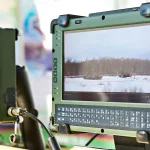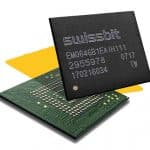
Mission critical (aerospace/military/defence)
Why spatial flash storage is a major issue

The aerospace sector, from New Space pioneers to constellation programmes, demands absolute reliability. In this extreme environment (radiation, temperatures), a system error is unacceptable.
Critical applications such as Earth observation, satellite communications, or orbital services rely on fast, reliable, and secure data processing.
The advent of LEO (Low Earth Orbit) satellites increases the demand for rugged, high-performance flash storage solutions capable of withstanding the extreme conditions of space vacuum.
Why COTS SSDs fail in the space environment
COTS (Commercial Off-The-Shelf) solutions, while attractive in terms of cost and availability, exhibit serious vulnerabilities against space radiation (TID, SEE).
Tests conducted on industrial and automotive SSDs reveal critical failures:
- Irrecoverable data loss
- Errors in controllers, DRAM, and NAND
- Sensitivity to SEE effects and latchup
Non-ruggedised SSDs often fail at moderate radiation doses, making their use risky for critical embedded systems.
Our ruggedised space SSDs: reliable, high-performance, radiation-resistant
Mozaïk Storage offers SSDs and flash memories designed for aerospace, qualified to operate in the most extreme environments. Our partners (Swissbit, Exascend) incorporate:
- Qualified industrial components
- Enhanced resistance to TID/SEE
- Extended temperature range
- Security: AES-256, TCG Opal 2.0, protection against power loss
Each solution is customisable to meet the payload or specific space mission requirements.
Swissbit & Exascend: space and Low Earth Orbit (LEO) qualified SSDs
Swissbit
Swissbit is a leader in embedded space storage.
Among their flagship products already used in orbit:
- SSD M.2 N-30 (4 TB) – used by NASA, ultra-reliable in LEO
- SSD M.2 SATA X-600 (128 GB SLC) – maximum endurance, wide temperature range
- Micro SD S-56u/S-56 – embedded video storage tested in orbit with a Japanese manufacturer
Other series available for aerospace: EN-26, N2000.
Exascend
Exascend offers SSDs equipped with specific technologies such as:
- Neutron Shield 2.0 to correct bitflips
- “Fail-safe” function with auto-reinitialisation
- SSD PR4 designed for critical applications in irradiated environments
Mozaïk Storage: expert in specialised storage for satellites and constellations
By working with Mozaïk Storage, you benefit from:
- Rugged industrial SSDs for space, tested under real conditions
- Guaranteed data integrity and thermal stability
- Customisation for specific payloads and embedded systems
- Expert technical support and solutions validated by major space industry players
Speak to a space flash storage expert today
Don’t let storage compromise the success of your mission. Contact Mozaïk Storage specialists to collaboratively define the optimal solution.

FAQ about space flash storage
What is the difference between a ruggedised SSD and a COTS SSD?
A ruggedised SSD is designed to operate in extreme environments (radiation, temperature, vibrations), unlike standard COTS SSDs. It is tested for TID/SEE and uses certified industrial components.
Why use industrial SSDs in LEO satellites?
LEO satellites operate in a zone with high exposure to energetic particles. Industrial SSDs ensure service continuity without data corruption.
Are Swissbit solutions already used in space?
Yes. Swissbit provides SSDs that are already qualified and tested in orbit, notably by NASA and other international space agencies.
What protections do Mozaïk SSDs offer against radiation?
They incorporate technologies like Neutron Shield, protected DRAM, and firmware redundancy to withstand SEE and TID effects.
Can an SSD be customised for a specific mission?
Yes. Our partners offer bespoke SSDs tailored to the thermal, mechanical, and reliability needs of payloads.







